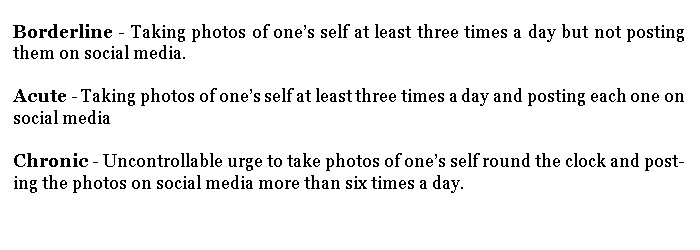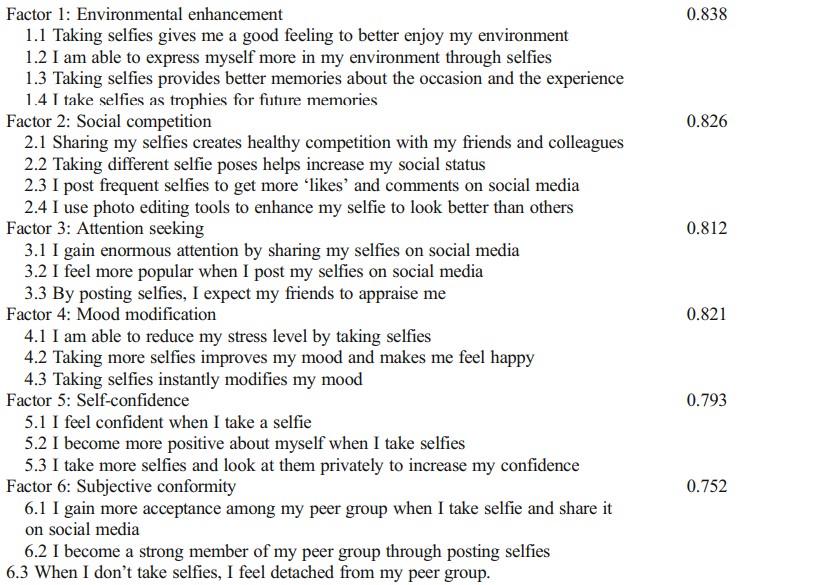I believe that as I’m writing this article there are thousands, maybe millions of people in the world posing for a selfie, ranting they didn’t get the right angle or wondering which selfie should get its place on Instagram.
Selfies are literally overflowing our world. And with the rise of technology, people are more obsessed than ever.
Тhere has been a lot of discussion about them in the media as well. In fact, just recently, the word selfie was added to the Oxford’s online dictionary.
Selfie (noun)
A photograph that one has taken of oneself, typically one taken with a smartphone or webcam and shared via social media.
Yeah.
It was only a matter of time until someone made this obsession a real mental condition. And so, it happened.
In 2014, a viral story emerged on the internet stating that American Psychiatric Association is considering the trending selfie obsession as a new-found mental disorder, also called Selfitis.
Even though the story turned out to be a hoax, it certainly intrigued a lot of scientists out there.
Because researchers Janarthanan Balakrishnan of the Thiagarajar School of Management in Madura, India, and Mark D. Griffiths of Nottingham Trent University in Nottingham, UK were more than determined to investigate whether there was any truth in the so-called ‘Selfitis’ phenomenon.
The study explored the concept and collected the needed data by classifying the participants in three, confirmed levels of ‘Selfitis’:
225 students (average age = 20.93 years) from two Indian universities were pooled and categorized in those three condition groups (borderline group – 15 females, 28 males), (acute group – 38 females, 34 males), and (chronic group – 22 females, 11 males).
The remaining students weren’t categorized into any of the groups because they didn’t match the threshold requirement.
The moderators carried out 7 focus group interviews on different aspects. They asked the participants questions like “What compels you to take selfies?”, “Do you feel addicted to taking selfies?”, “Do you think that someone can become addicted to taking selfies?”, etc.
Initially, 734 students were recruited for the second phase of the study. Out of all 734, only 400 students satisfied the condition of belonging to one of the three possible categories.
Researchers discovered that the typical ‘Selfitis’ sufferers were attention-seeking individuals who lacked in self-confidence and searched for a way to boost their social status by constantly sharing pictures of them on social media.
Dr. Janarthanan Balakrishnan, a research associate from Nottingham Trent’s Department of Psychology, said: “Typically, those with the condition suffer from a lack of self-confidence and are seeking to ‘fit in’ with those around them, and may display symptoms similar to other potentially addictive behaviors.”
“Now the existence of the condition appears to have been confirmed, it is hoped that further research will be carried out to understand more about how and why people develop this potentially obsessive behavior, and what can be done to help people who are the most affected.” –Dr. Balakrishnan added.
They’ve published their new paper in the International Journal of Mental Health and Addiction with a title “An Exploratory Study of ‘Selfitis’ and the Development of the Selfitis Behavior Scale.”
Dr. Mark Griffiths, Distinguished Professor of Behavioural Addiction in Nottingham Trent University’s Psychology Department, also stated: “Whilst the story was revealed to be a hoax, it didn’t mean that the condition of Selfitis didn’t exist.
“We have now appeared to confirm its existence and developed the world’s first Selfitis Behavior Scale to assess the condition.”
The scale includes 20 statements and is used to determine the severity of the ‘Selfitis’ disorder in individuals. The examples include “I feel more popular when I post my selfies on social media” or “I post frequent selfies to get more likes and comments on social media”.
So, what do you think? Do you consider yourself as a chronic ‘Selfitis’ sufferer based on these scales?
SOURCES:
HTTPS://LINK.SPRINGER.COM/CONTENT/PDF/10.1007/S11469-017-9844-X.PDF
HTTP://WWW.TSM.AC.IN/
HTTPS://WWW.NTU.AC.UK/



